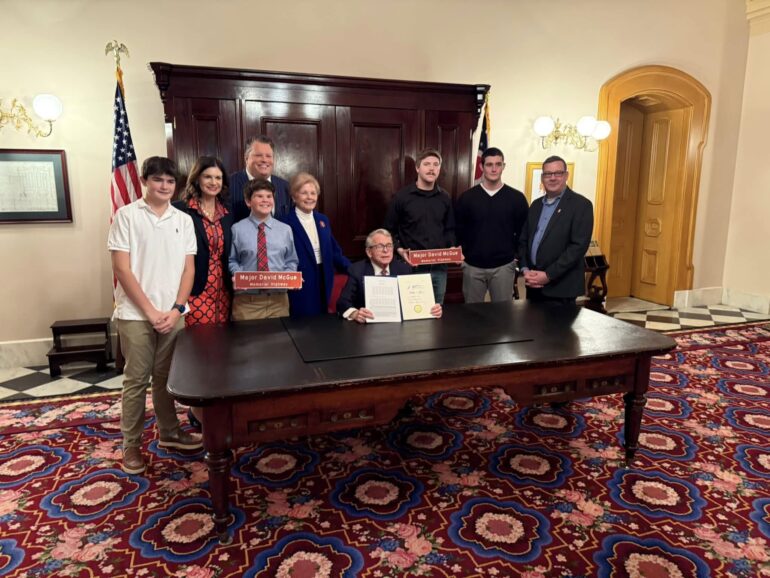Download Our Mobile App And Take WKTN With You . > > > > > > > > > > IT'S FREE!!
WASHINGTON, DC – Today, U.S. Senator Sherrod Brown (D-OH) delivered remarks at the Ohio Farm Bureau breakfast in Washington, DC. The senator discussed a number of topics, including the United States-Mexico-Canada Agreement Implementation Act (USMCA), which includes important worker-empowering provisions that he fought for and secured; disaster assistance for Ohio farmers; improving water quality; expanding broadband access in rural communities, and implementation of the 2018 Farm Bill.
As the first Ohioan to serve on the Senate Agriculture Committee in more than 50 years, Brown held roundtables around Ohio to hear from Ohio farmers and rural communities about what they wanted to see in the 2018 Farm Bill. Brown was a member of the conference committee tasked with reconciling the differences between House and Senate versions of the legislation, and fought to secure provisions that were important to Ohio farmers in the final bill that was signed into law.
Brown’s remarks at the annual breakfast, as prepared for delivery, follow.
Sen. Brown Remarks
Ohio Farm Bureau Breakfast
Wednesday, March 11, 2020
Thank you to Mike Videkovich for that introduction and for your leadership.
Thank you to Adam, Yvonne, Jack, and everyone at OFBF.
And thank you to the wait staff – we always honor hourly wage earners, who never get paid as much as they deserve
It’s great to be back with Ohio farmers.
First I want to say a couple words about what I’m sure is first on everyone’s mind, the coronavirus.
Our first priority is keeping Americans safe. We passed a supplemental spending package last week that is sending more than $15 million to Ohio, with the option to apply for more if things get worse.
I’ve spoken to the governor on the phone, we’re in close contact with his team and the Ohio Department of Health.
We also can’t ignore the millions of Americans who are losing paychecks and the small businesses that are losing customers.
When times get tough, we come together as Americans and we rise to the challenge. I’m confident we can do that again – and it has to mean support for everyone who makes this country work, not just Wall Street.
We know the first inclination of too many in Washington is to move heaven and earth to save big corporations and their CEOs – but we can’t overlook everyone else.
It’s why people in the heartland, especially in small towns, feel overlooked and ignored – because too often, they are.
Jobs have moved overseas, while the addiction crisis has moved in. Farm bankruptcies are up. Prices are low while input costs are high. It’s almost impossible to make a living without off-farm income.
Those are the challenges so many of you are facing. And I’m with you in that fight.
We all know that farming is unpredictable—from the weather to larger economic conditions to the price of fertilizer or fuel.
That’s a key reason we pass a Farm Bill every 4 or 5 years: to help reduce some of the uncertainty in farming through Title I programs, conservation funding, and research programs.
And I know the increasing role exports have played for Ohio farmers and American agriculture over the past 30 years.
I know that sometimes has put me in a different place on trade than farmers, and than presidents of both parties.
What I have said to you all in the past and believe today, is that any trade deal needs to be as good for a small manufacturer in Defiance or Toledo as it is for a farm in Darke County.
People want to pit farmers against workers, but there is no reason we can’t negotiate a good deal for everyone.
That’s why this year, for the first time in my career, I voted for a trade agreement – because we were able to improve the president’s deal, and negotiate the strongest ever labor enforcement provisions in a U.S. trade deal.
I disagree with the President on many things, but I took him at his word when he said he wanted to renegotiate NAFTA.
Last year when we got an initial draft of President Trump’s agreement, it was nowhere near the good deal for workers President Trump promised – it was pretty much another corporate trade deal.
So we went to work, talking with the Trump Administration about how we could improve the deal.
My goal in these negotiations was to stop the race to the bottom where big companies move jobs overseas and continue the race to the bottom.
And at the end of the day, I was able to secure our Brown-Wyden provision that amounts to the strongest-ever labor enforcement in a U.S. trade deal.
The Brown-Wyden worker protection provision sets an important precedent that must be included in every future trade agreement.
The new deal, USMCA, reaffirms our important agricultural trade relationships with Mexico and Canada and, I believe it can serve as a model for increasing access for farmers to other foreign markets.
Of course, this new deal is not going to give you too much certainty when this Administration has such a chaotic approach to China.
The president and his cabinet claimed that the Phase One agreement would increase agricultural sales to China to $40 billion this year.
Yet, less than a week later, his own economists at USDA projected that China would purchase less than half that amount.
For the past several years, the President has asked farmers to trust him on his trade war with China and his continued attempts to undermine renewable fuels by giving biofuel waivers to oil companies.
This has resulted in lower commodity prices across the country.
Farmers need more than empty promises or one-time purchases from China: what Ohio farmers deserve is reciprocal access to China’s market, which this deal does not provide.
Whether it’s with China or with Mexico and Canada, I refuse to accept that we can’t have a trade policy that’s good for workers and farmers. I will continue to fight for trade policies with China that actually help farmers and companies compete on a level-playing field.
One of my top priorities in the 2018 Farm Bill was a strong conservation title that worked for farmers and taxpayers.
That means making it easier for farmers to enroll in programs and prioritizing the ones that help us get the most environmental bang for the buck.
We were able to increase funding for programs that targeted run-off and invest in soil health.
And I’m pleased that the statehouse recognized the ongoing water quality challenges across Ohio by funding H2 Ohio.
I appreciate the Farm Bureau’s support and engagement in this and other USDA programs—we won’t see the water quality improvement we all want if people don’t use these programs.
You know that the Farm Bill isn’t just about what happens the year we write the bill – this next phase is just as important.
That means looking at another basin-wide Regional Conservation Partnership Program grant, looking at new ways the agricultural sector can help fight climate change, and improving the resiliency of our fields and crops in light of the extreme weather that seems to be the new normal.
We want to keep this dialogue open – whether it’s helping you take advantage of new conservation programs, or making sure the administration is implementing the commodity title improvements, as commodity prices remain flat.
Written by: WKTN Staff
Similar posts
Copyright WKTN-Home Town Media | Public File | FCC Applications | ADMIN | 112 N. Detroit Street, Kenton, OH 43326 | 419-675-2355


